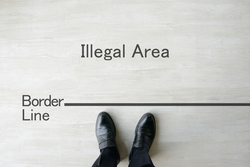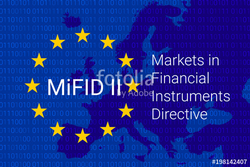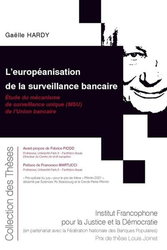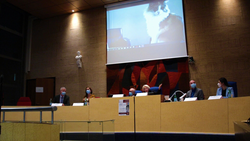Food for thoughts
Feb. 16, 2022
Teachings : Droit de la régulation bancaire et financière - semestre 2022

 ► Référence complète : Frison-Roche, M.-A., Les principes et la place de la répression dans le Droit de la Régulation et de la Supervision bancaire et financière, in Leçons de Droit de la Régulation bancaire et financière, Sciences po (Paris), 16 février 2022.
► Référence complète : Frison-Roche, M.-A., Les principes et la place de la répression dans le Droit de la Régulation et de la Supervision bancaire et financière, in Leçons de Droit de la Régulation bancaire et financière, Sciences po (Paris), 16 février 2022.
____
► Résumé de la leçon sur les principes et la place de la répression dans le Droit de la Régulation et de la Supervision bancaire et financière : Après avoir vu précédemment les règles techniques qui gouvernent la sanction et la prévention des Abus de marché, il convient pour mieux comprendre les décisions et les conflits de revenir sur la tension permanente et peut-être définitive qui marque les principes et la place de la répression dans le Droit de la régulation bancaire et financière : dans le même temps qu'elle est un outil presque ordinaire de la Régulation, puisque la répression des abus de marché assure l'intégrité et le fonctionnement des marchés financiers, la répression ne peut et ne doit se soustraire à ce avec quoi elle entretient un lien de filiation : le Droit pénal. Dès lors et par exemple, alors qu'au premier titre, l'efficacité est son premier souci, au second titre, les droits de la défense et le souci des secrets demeurent, tandis que la nature régalienne du Droit pénal trace un cercle par nature national alors que la Régulation financière est au mieux mondiale, au moins européenne.
Il convient de reprendre cette question à travers une perspective plus générale, notamment à travers le Droit pénal et le droit européen.
En effet, dans le même temps et parce qu'il s'agit de mécanismes qui ne peuvent pas faire sécession avec le système juridique, sa structure et ses fondements, l'on pourrait penser que la répression en matière bancaire et financière est une déclinaison du droit pénal général, qu'elle en emprunte et en respecte les principes généraux, concevant des infractions spéciales pour les besoins qui lui sont propres. Ainsi, tout ce qui caractérise le Droit pénal , l'élément intentionnel de l'infraction, le caractère restrictif de l'interprétation des textes, le principe de la personnalité des délits et des peines, le système procédural indissociable des règles substantielles (comme les charges de preuve ou le principe non bis in idem) devrait s'appliquer dans des infractions générales qui concernent le secteur , comme l'escroquerie ou l'abus de confiance comme dans les infractions plus particulières, comme l'abus de biens sociaux, voire des infractions spécifique comme le blanchiment d'argent.
Mais et tout d'abord, par souci d'efficacité , le droit a tout d'abord développé un système de répression qui a emprunté d'autres méthodes, imprégnées avant tout du souci d' efficacité . En outre, le droit a organisé une sorte de double jeu répressif, par un droit administratif répressif à la disposition des régulateurs, qui prend assez souvent distance par rapport au droit pénal classique, lequel continue pourtant de s'exercer.
Les tensions ne peuvent qu'apparaître. A l'intérieur du droit pénal , dont les principes sont assouplis alors que la rigidité du droit pénal est dans sa nature même, dans l'articulation du droit pénal avec le droit administratif répressif , guidé par le service efficace de l'ordre public de marché, les Cours constitutionnelles tentant de garder un équilibre à l'ensemble.
Il faut sans doute prendre acte que contrairement aux principes classiques, le droit pénal financier n'est plus autonome du reste de la régulation , la répression devient objective, l' efficacité est son critère et ses objectifs sont systémiques. La loi dite "Sapin 2" le manifeste en internalisant tout le dispositif répressif dans les opérateurs eux-mêmes, devenant à la fois les assujettis et les agents d'effectivité de la Régulation .
____
🔎 Revenir aux bases avec le Dictionnaire bilingue du Droit de la Régulation et de la Compliance
🔎 Approfondir par la Bibliographie générale de Droit de la Régulation bancaire et financière
🔎 Revenir à la présentation générale du cours
🔎 Se reporter au plan général du cours
____
Voir ci-dessous le reste des supports utiles au suivi profitable de la leçon
Feb. 15, 2022
Compliance: at the moment

Feb. 11, 2022
Compliance: at the moment

Feb. 9, 2022
Teachings : Droit de la régulation bancaire et financière - semestre 2022

 ► Référence complète : Frison-Roche, M.-A., Prévention et sanction des Abus de Marchés, in Leçons de Droit de la Régulation bancaire et financière, Sciences po (Paris), 9 février 2022.
► Référence complète : Frison-Roche, M.-A., Prévention et sanction des Abus de Marchés, in Leçons de Droit de la Régulation bancaire et financière, Sciences po (Paris), 9 février 2022.
____
► Résumé de la leçon sur les Abus de marché : Dans une conception classique et du Droit et du "libre marché", le principe est la liberté d'action de la personne. Même si l'exercice de cette liberté, voire d'un droit subjectif peut causer un dommage, par exemple un dommage concurrentiel, c'est en quelque sorte le prix légitime d'une société libre et concurrentielle. Ainsi dans une conception libérale, seul l'abus est sanctionné, c'est-à-dire l'exercice fautif que l'on fait de sa liberté ou de son droit, allant parfois jusqu'à l'exigence d'une faute qualifiée.
Mais les secteurs bancaires et financiers ne sont pas gouvernés par le principe de libre concurrence. Ils sont gouvernés par le principe de régulation, le principe de concurrence n'y a qu'un rôle adjacent. Cela ne pourra qu'engendrer de graves difficultés lorsque le Droit de la concurrence et le Droit bancaire et financier font s'appliquer d'une façon cumulée ou confrontée sur une même situation.
Les marchés financiers sont construits sur le principe de régulation qui pose le principe de transparence et de partage d'une information exacte : c'est ainsi que l'intégrité des marchés financiers est assurée, l'Autorité des Marchés financiers en étant le gardien.
La prévention et la sanction des "abus" de marché est donc non pas une part résiduelle du Droit financier, mais un pilier de celui-ci, contrairement au Droit des marchés ordinaires concurrentiels, sur lesquels l'opacité et le non-partage des informations est la règle.
Cela explique l'état du droit des "abus de marché", dont l'effectivité de la prohibition est essentielle pour le bon fonctionnement ordinaire des marchés financiers. Leur prohibition nationale a été harmonisée par le Droit de l'Union européenne, à travers des textes dont les signes reprennent l'appellation anglaise : Market abuses (ainsi le nouveau Règlement communautaire sur les abus de marché est dit Règlement MAR (Market Abuses Regulation) et la directive qui l'accompagne MAD (Market Abuses Directive).
Il sanctionne un certain nombre de comportements, qui portent atteinte à l'intégrité des marchés,
Mais il n'exprime plus des exceptions par rapport à un principe : des fautes par rapport à des libertés ou à des droits. Il exprime des moyens par rapport à des principes dont la sanction des abus ne constitue que la concrétisation de principes dont ils sont la continuité même : l'efficacité du marché, son intégrité, sa transparence, l'information de l'investisseur.
C'est pourquoi la sanction des abus de marché ne sont pas du tout un phénomène périphérique par rapport à la Régulation des marchés financiers et à l'activité et au fonctionnement des bancaires, comme l'est le Droit pénal : elle est au contraire à la fois ordinaire et centrale. Cette différence des deux ordres publics va se retrouver dans la question lancinante de la sanction pénale et de la sanction administrative des mêmes abus de marché (par exemple "manquement d'initié" et "délit d'initié", qui ont tendance à se cumuler dans des techniques de répression qui seront l'objet de la prochaine leçon.
_____
🔎 Accéder aux slides servant de support à la leçon sur les abus de marché
🔎 Revenir aux bases avec le Dictionnaire bilingue du Droit de la Régulation et de la Compliance
🔎 Approfondir par la Bibliographie générale de Droit de la Régulation bancaire et financière
🔎 Revenir à la présentation générale du cours
🔎 Se reporter au plan général du cours
____
Utiliser les matériaux ci-dessous pour aller plus loin et pour préparer votre conférence de méthode ⤵️

Updated: Feb. 5, 2022 (Initial publication: Oct. 10, 2021)
Publications

 ► Full Reference: Frison-Roche, M.-A., Duty of Vigilance, Whistleblowing and International Competitiveness, Working Paper, September 2021.
► Full Reference: Frison-Roche, M.-A., Duty of Vigilance, Whistleblowing and International Competitiveness, Working Paper, September 2021.
____
🎤 this Working Paper is the basis for a conference , in the colloquium Effectiveness of Compliance and International Competitiveness, co-organised by the Journal of Regulation & Compliance (JoRC) and the Center for Law and Economics of the Panthéon-Assas University (Paris II), November 4, 2021
____
📝this Working Paper is also the basis for an article. This article is to be published ⤵
in its French version in the book 📕Les buts monumentaux de la Compliance, in the series 📚Régulations & Compliance
in its English version in the book 📘Compliance Monumental Goals, in the series la collection 📚Compliance & Regulation
____
► Working Paper Summary: The "Compliance Tools" are very diverse. If it has been chosen to study more particularly among these the obligation of vigilance and the whistleblower, these rather than others and to study them together, it is because they present in the perspective of the specific topic chosen, namely "international competitiveness", and for companies, and for economic zones considered, and for legal system inseparable from them, a uniqueness: these are mechanisms which release Information.
By order of the law, the company will not only stop ignoring what it covered with the handkerchief that Tartuffe held out to it or that a conception of Company Law legitimately allowed it to ignore. This article does not examine if this revolution made by Compliance Law expresses in the legal system is on the one hand legitimate and on the other hand effective: the article measures what is happening at the regard to "international competitiveness".
Compliance Law is therefore be examined here through its instruments, and not in relation to its normativity. In fact, its instruments are intended to provide Information and to make this information available, in its presentation, in its intelligibility and in the hands of those who are able to use Information in perspective of the Compliance Monumental Goals, achieving them.
Regarding this central notion of Information, international competitiveness will be more particularly concerned because Compliance Law will oblige the company itself to seek out, then expose to everyone's eyes, in particular its competitors, its weaknesses, its projects, its alliances, its flaws. This does not pose a problem if its competitors themselves are often subject to this new branch of Law, which goes far beyond transparency, which is already a new mechanism because a company is not a transparent organization and Competition Law that governs ordinary businesses never required this. But if they are not subject to this incredibly special branch of Law that is Compliance Law, then there is a distortion of competitiveness by the very fact of the Law.
It is possible to pretend that the markets like virtue, that they give it credit because they are themselves based on the idea of "promise", which is ultimately based on a moral concept, but this provision of Information to others, while others remain opaque, is a major problem of competitiveness, which the legal requirement of "loyal commercial practices" only very partially considers.
Therefore, it is necessary to first examine what is the economic and financial power of the information captured by the company on itself thank to Compliance Law making available to all but firstly to the compagny itself through the whistblowing mechanism, organised by the laws, differently in the US and Europe (I). Compliance Law also obliges companies to be accountable not only for what they do but also for what others do for them. Through the obligation of Vigilance, objective Ex Ante obligation and duty, the company obtains a power of Information on others which could well resolve what is often presented as the dispute aporetic of the extraterritoriality of Compliance Law, thus making accountable companies hitherto protected by their "preserved" legal system and thereby affected by the effectiveness of Compliance Law (II).
____
read below the developments
Feb. 2, 2022
Teachings : Droit de la régulation bancaire et financière - semestre 2022

 ► Référence complète : Frison-Roche, M.-A., Le Droit européen de régulation et de supervision bancaire et financière, in Leçons de Droit de la Régulation bancaire et financière, Sciences po (Paris), 2 février 2022.
► Référence complète : Frison-Roche, M.-A., Le Droit européen de régulation et de supervision bancaire et financière, in Leçons de Droit de la Régulation bancaire et financière, Sciences po (Paris), 2 février 2022.
____
► Résumé de la leçon sur le Droit européen de Régulation et de Supervision bancaire et financière : L'Europe est avant tout et pour l'instant encore une construction juridique. Elle fut pendant longtemps avant tout la construction d'un marché, conçu politiquement comme un espace de libre circulation (des personnes, des marchandises, des capitaux). C'est pourquoi le Droit de la Concurrence est son ADN et demeure le cœur de la jurisprudence de la Cour de justice de l'Union européenne, qui tient désormais l'équilibre entre les diverses institutions, par exemple la Banque Centrale Européenne, dont les décisions peuvent être attaquées devant elle. Mais aujourd'hui le Droit de l'Union européenne se tourne vers d'autres buts que la "liberté", laquelle s'exprime dans l'immédiat, notamment la "stabilité", laquelle se développe dans le temps. C'est pourquoi la Banque y prend un si grande importance.
En outre, face aux "libertés" les "droits" montent en puissance : c'est par les institutions juridiques que l'Europe trouve de plus en plus son unité, l'Europe économique et financière (l'Union européenne) et l'Europe des droits humains (le Conseil de l'Europe au sein duquel s'est déployée la Cour européenne des droits de l'Homme) exprimant les mêmes principes. C'est bien à travers une décision prenant appui sur le Droit de la concurrence que la Commission européenne le 18 juillet 2018 a obligé Google à concrétiser le "droit d'accès" à des entreprises innovantes, apte à faire vivre l'écosystème numérique, tandis que le Régulateur financier doit respecter les "droits de la défense" des personnes qu'il sanctionne.
Aujourd'hui à côté de l'Europe économique se développe en même temps par des textes une Europe bancaire et financière (on ne sait pas si par le Droit - par exemple le droit de la propriété intellectuelle - existera une Europe industrielle).La crise a fait naître l'Europe bancaire et financière. L'Union bancaire est issue de Règlements communautaires du 23 novembre 2010 établissant des sortes de "régulateurs européens" (ESMA, EBA, EIOPA) qui donnent une certaine unité aux marchés financiers qui demeurent nationaux, tandis que les entreprises de marché, entreprises privées en charge d'une mission de régulation, continuent leur déploiement selon des techniques de droit privé. L'Union bancaire est née d'une façon plus institutionnelle encore, par trois piliers qui assurent un continuum européen entre la prévention des crises, la résolution des crises et la garantie des dépôts. En cela, l'Europe bancaire est devenue fédérale.
Sur les marchés de capitaux, des instruments financiers et des titres, l'Union européenne a utilisé le pouvoir que lui confère depuis la jurisprudence Costa et grâce au processus Lamfallussy d'une sorte de "création continuée" pour injecter en permanence de nouvelles règles perfectionnant et unifiant les marchés nationaux. C'est désormais au niveau européen qu'est conçu la répression des abus de marché mais aussi l'information des investisseurs, comme le montre la réforme en cours dite "Prospectus 3". A l'initiative de la Commission Européenne, les textes sont produits en "paquet" car ils correspondent à des "plan d'action " . Cette façon de légiférer est désormais emprunté en droit français, par exemple par la loi dite PACTE du 29 avril 2019. Cette loi vise - en se contredisant parfois - à produire plus de concurrence, d'innovation, à attirer l'argent sur des marchés dont l'objectif est aussi la sécurité, notion d'égale importance que la liberté, jadis seul pilier du Droit économique. Conçue par les but, La loi est définitivement un "instrument", et un instrument parmi d'autres, la Cour de Justice tenant l'équilibre entre les buts, les instruments et les institutions.
La question du "régulateur" devient plus incertaine : la BCE est plus un "superviseur" qu'un "régulateur" ; le plan d'action pour une Europe des marchés de capitaux ne prévoit pas de régulateur, visant un capitalisme traditionnelle pour les petites entreprises (sorte de small businesses Act européen).
____
____
Se reporter au Plan complet du cours.
____
Revenir aux bases avec le Dictionnaire bilingue du Droit de la Régulation et de la Compliance.
__________________________________________________________________________
Documentation spécifique à cette leçon sur
l'Europe du Droit de la Régulation bancaire et financière
Documentation sur les textes et les institutions :
- Présentation par la BCE du système unique de supervision (single supervisory mechanism) (en anglais), qui prend soin de rattacher la supervision à la fonction d'origine de la BCE.
- Présentation du Fond de Résolution unique par lui-même (en anglais)
- Présentation du nouveau Règlement dit Prospectus III par l'AMF (adopté en 2017, applicable en 2019
- La transformation du Droit français par l'adoption du Règlement dit Prospectus III
- Présentation du paquet MIR 2 par l'AMF
- The European RuleBook
- MoU entre l'ESMA et la Financial Conduct Authority, 1ier février 2018.
- Capital Markets Union Action Plan, 2019
- Présentation par l'AMF des Réglements de l'Union européenne "Prospectus 3" et leur transposition, 2019
Documentation sur la jurisprudence :
- ESMA, 11 juillet 2018, Danske Bank
- Article sur l'arrêt de la Cour suprême britannique du 4 juillet 2018, Goldman Sach v/Novo Banco
- CJCE, 15 juillet 1964, Costa
- CJCE, 16 juin 2015,
- Cons. cons., 6 février 2015, Société mutuelle de transports Assurance
- AMF, Comm. sanction, 24 janvier 2019, BRED
________
Jan. 31, 2022
Thesaurus : Doctrine
► Référence complète : Hoynck, S., Le juge administratif et le dérèglement climatique. Libres propos, AJDA, 2022, p.147 et s.
____
► Résumé de l'article par l'auteur : C'est essentiellement depuis la signature de l'accord de Paris que les juges - pas seulement en France - ont été invités par diverses requêtes à prendre leur part dans la lutte contre le dérèglement climatique. Le risque de tels contentieux est qu'ils n'aient qu'une dimension incantatoire, qu'ils ne permettent que de décerner des bons ou des mauvais points à la politique climatique d'un gouvernement, ce qui n'est pas la conception que le juge administratif français se fait de son office. Si de tels contentieux ne sauraient à l'évidence constituer la solution unique à la crise climatique, le juge a bien son rôle à jouer.
Jan. 26, 2022
Teachings : Droit de la régulation bancaire et financière - semestre 2022

► Résumé de la leçon n°1 de droit de la régulation bancaire et financière : La "Régulation" ne se confond pas avec la "réglementation". Elle constitue un "Droit" spécifique, dont la "réglementation" n'est qu'un outil, comme le sont les lois, les décisions de justice, etc., qu'ils prennent la forme d'actes obligatoires (hard Law) ou s'adressent simplement à ceux qui sont concernés (soft Law). La "Régulation" ne se confond pas davantage avec la "Supervision", avec laquelle elle se cumule souvent, comme ici en matière bancaire et financière. Ainsi, en-deçà des multiples Codes, par exemple le Code monétaire et financier, ce sont avant tout les Autorités de régulation et de supervision qui fabriquent et font vivre ce "Droit de la Régulation bancaire et financière", à travers non seulement textes et décisions, mais encore leur doctrine, souvent exprimée par des communiqués et lignes directrices, qui ont souvent plus d'impacts que les textes eux-mêmes.
Il convient donc de débuter par les institutions françaises : l'Autorité des marchés financiers (AMF) et l'Autorité de contrôle prudentiel et de résolution (ACPR).
Ces autorités sont elles-mêmes ancrées dans le système juridique français et ont des relations entre elles mais elles sont et entremaillées au niveau européen et s'insèrent en outre dans des relations internationales constantes. Il est impossible de les appréhender indépendamment de ces différents ancrages, notamment le système juridique français, lequel se déploie entre les deux ordres de juridictions, juridictions judiciaires et juridictions administratives, substantiellement unis autour des principes constitutionnels, et s'ancre dans l'ordre de l'Union européenne. Mais de fait, parce que la banque, et plus encore la finance, ne sont pas contenues dans les frontières des systèmes juridiques, le Droit américain, plus proche du Droit britannique (Common Law) que du Droit européen continental (Civil Law) dont la France et l'Allemagne demeurent l'expression, sont la source première d'influence.
Après avoir fixé quelques définitions et avoir rappelé le raisonnement privilégié en Droit de la Régulation, prenant l'AMF puis l'ACPR, la première partie de la leçon décrit de l'AMF, qui succéda à la COB, née en 1967 par copie de la SEC américaine, suppose que l'on expose son statut, sa composition, ses pouvoirs et les contrôles dont elle est l'objet. Cette description institutionnelle vise à faire comprendre ce à quoi cette institution sert, c'est-à-dire ses missions : cela correspond à la définition même du "Droit de la Régulation", branche du Droit téléologique, c'est-à-dire définie par ses finalité (ce qui n'est pas la façon classique de définir une branche du Droit). C'est en raison de sa finalité, à savoir la préservation de l'équité, la transparence et la liquidité des marchés financiers, ce qui lui permet de protéger l'épargne publique, que l'on comprend pourquoi l'AMF est consubstantiellement indépendante (règle de valeur constitutionnelle, sur laquelle nous aurons l'occasion de revenir).
De nombreux modèles institutionnels existent et on les expérimente les uns après les autres. Le secteur des banques et des assurances continue d'être régulé par une Autorité administrative adossée à la Banque de France, l'ACPR, dont il convient de faire une semblable description. L'on y voit une grande similarité institutionnelle, ce qui permet de mesurer ce qui fait la différence en Droit entre le secteur bancaire et le secteur financier.
____
🔎 Regarder les slides servant de base à la leçon n°1 relative aux institutions bancaires et financières de régulation et de supervision.
🔎 Revenir aux bases avec le Dictionnaire bilingue du Droit de la Régulation et de la Compliance.
🔎 Approfondir par la Bibliographie générale du Droit de la Régulation bancaire et financière
Utiliser ci-dessous les matériaux pour aller plus loin et préparer votre conférence de méthode⤵️.
Jan. 25, 2022
Thesaurus : Doctrine
► Référence complète : Jeanneney, J., Être citoyen, obéir aux lois, Jus Politicum, vol. 27, 2022, p. 143-171.
___
______
Updated: Jan. 24, 2022 (Initial publication: )
Thesaurus : Doctrine
Référence complète : Dupré, B., Souveraineté européenne, autonomie stratégique, Europe puissance : quelle réalité pour l’Union européenne et pour quel avenir ?, Fondation Robert Schuman, Question d'Europe, n°620, janv. 2022.
____
Jan. 20, 2022
Thesaurus : Doctrine

Jan. 19, 2022
Organization of scientific events

► Full Reference: Frison-Roche, M.-A., coordination and moderation of the conference L'office du juge et les causes systémiques (""The Office of the Judge and systemic causes"), in Cycle of Conferences, Penser l'office du juge ("Thinking the Office of the Judge"), Grand Chamber of the Cour de cassation, Paris, May 9, 2021, 17h-19h.
The conference is held in French.
____
► General presentation of the conference: the conference is based on the intervention of three judges, Christophe Soulard, Fabien Raynaud, and François Ancel, who think and debate among themselves on a hypothesis: the existence of "systemic causes". The hypothesis is that beyond and through the diversity of disputes and cases that are submitted to the most diverse judges, there is a category of cases that are systemic, which means containing in what is submitted to the judge for resolution a system. If such a category exists, which also raises the question of the diversity of systems and the difficulty arising from their submission to rules that are not legal (for example economic, biological, financial "laws", etc.) , then the judge should take this into account, both in the procedure and in the judgment they make on the case and in the way they formulate et restitute this judgment.
____
📝read the presentation of this conference by the Cour de cassation (in French)
📝read the program of the cycle of conferences 2022 (in French)
____
🎥see the conference video (in French)
🎥 see the synthesis video of the conference, made in situ by Marie-Anne Frison-Roche (in French)
____
✏️read the notes taken during the conference to make the synthesis (in French)
📝read the article of Marie-Anne Frison-Roche restituting this conference, published in the Recueil Dalloz (in French)
____
►read the works, basis of the two interventions of Marie-Anne Frison-Roche
🚧 L'hypothèse de la "cause systémique (made before the conference to prepare it), available en English
📝Synthese of the conference (made during the conference)
________
Jan. 15, 2022
Thesaurus
Référence complète : Berg, F., Koelberl, J.F. & Rigobon, R., Aggregate Confusion: The Divergence of ESG Ratings,2022.
____
Jan. 15, 2022
Compliance: at the moment

Jan. 13, 2022
Thesaurus : Doctrine

► Full Reference: E. Wennerström, "Some Reflections on Compliance and the European Court of Human Rights", in M.-A. Frison-Roche (ed.), Compliance Jurisdictionalisation, Journal of Regulation & Compliance (JoRC) and Bruylant, coll. "Compliance & Regulation", to be published.
____
📘read a general presentation of the book, Compliance Jurisdictionalisation, in which this article is published
____
► Summary of the article (done by the Journal of Regulation & Compliance): The development of the European Court of Human Rights case law, contributing to European integration, has incorporated the substantial concept of "compliance" which goes beyond the idea of legality with respect to which companies remain passive, and promotes legal orders as systems in interaction with one another.
The author develops the spirit and scope of Protocol 15 by which both the principle of subsidiarity and the margins of appreciation the signatory States are organized, mechanisms governed by the principle of proportionality. Subsidiarity means that the States are in the best position to design the most adequate application of the Convention, the close links between the States allowing its effective application. In addition, the new opinion procedure which allows a national court to have during a case the non-binding opinion of the ECHR ensures better compliance with the objectives of the Convention.
The case-law of the Court takes up this substantial requirement through its doctrine, in particular identified in the Bosphorus case, by stressing that the accession of a State to the European Union presumes its compliance when implementing EU law with the obligations arising from the ECHR, even if this presumption can be refuted if the protection is manifestly lacking, which was admitted in several cases, in particular concerning the right to an impartial tribunal in matters of economic regulation. The different legal orders are thus articulated.
The author concludes that the European Court of Human Rights, like the Court of Justice of the Union, contributes to the construction of Compliance Law in Europe, from an Ex Ante perspective favoring opinions rather than Ex Post sanctions and creating, in particular through the Bosphorus doctrine, elements of security and confidence for European integration around common values.
___
🦉This article is available in full text to those registered for Professor Marie-Anne Frison-Roche's courses
________
Jan. 11, 2022
Thesaurus : Doctrine

► Référence complète : Commission "Les Lumières à l’ère Numérique" présidée par Gérald Bronner, Rapport de la Commission. Les Lumières à l'ère numérique, janvier 2022, 124 p.
____
________

Jan. 5, 2022
Publications

♾️follow Marie-Anne Frison-Roche on LinkedIn
♾️subscribe to the Newsletter MAFR Regulation, Compliance, Law
____
► Full Reference: M.-A. Frison-Roche, Compliance Law and Climate. To prevent Climate Risk and build Climate Balance , January 2022.
, January 2022.
____
🎤 In its French version, this Working Paper had been written for a speech for the colloquium held under the scientific direction of Marta Torre-Schaub, Béatrice Lormeteau, & Anne Stevignon, Les risques climatiques à l’épreuve du droit Comment le droit fait-il face aux nouveaux risques engendrés par la crise climatique ? , at the University Panthéon-Sorbonne (Paris I), Amphithéâtre Liard, on March 17, 2022.
____
📝it is also the basis of an article : "Droit de la compliance et climat. Pour prévenir le risque et construire l'équilibre climatiques" ("Compliance Law and climate. Prevent the climate risk and build the climate balance")
____
► Summary of this Working Paper: Compliance Law is beginning to emerge in climate topic, through the expression "Climate Compliance Law", but the climate issue itself is the most perfect example of why General Compliance Law is made for. It is indeed a new branch of Law, a global Law claiming to provide Ex Ante solutions here and now for global issues, so that in the future systemic catastrophies will not occur, will not happen: it is these "Monumental Goals" that give meaning, coherence, and simplicity to Compliance Law.
Compliance Law, linked to the Rule of Law principle, makes it possible to go beyond the choice often presented between the effectiveness of the protection of the planet and the renunciation of freedoms, in particular the freedom to do business and the freedom of individuals, especially the protection of their data.
Climate is thus exemplary of the object of Monumental Goals of Compliance Law (I). The systemic risk that it now constitutes is analogous to Banking or Digital Systemic Risks and therefore calls for the application of identical legal Compliance Tools, formerly put in place for Banking Regulatory and Compliance Law, recently invented for Digital. Compliance Law, extending Regulation Law, itself from the precondition of the Sector and the Territory, is therefore the branch which makes it possible to put in place new legal solutions, either by force (judicial agreements, compliance programs, etc.), or by will (commitments, global charters, etc.).
Therefore, an alliance can exist between political and public authorities, and crucial economic operators (II), that the rise in power of the "raison d'être" is the sight and whose technical challenge is the collection of information that must be put in correlation. Scientists pooling Information, this public good, provided by public and private entities. The courts are at the center of this articulation between Compliance Law and Climate, which object is the Future.
____
🔓read the developments below⤵️
____
Jan. 4, 2022
Teachings : Droit de la régulation bancaire et financière - semestre 2022

Ce livret de cours décrit le contenu, la méthodologie et les objectifs du cours magistral de Droit de la Régulation bancaire et financière., tel qu'il se déroule au semestre de printemps 2022.
Le cours magistral est assuré par Marie-Anne Frison-Roche, agrégée des Facultés de Droit et professeur des Universités, titulaire à Sciences Po.
Autour de ce cours, des conférences sont assurées par des maîtres de conférence réunis dans une équipe pédagogique coordonnée par la professeure d'amphi.
Pour faciliter l'assimilation des techniques juridiques articulées à des techniques économiques et financières, Marie-Anne Frison-Roche met à disposition un Dictionnaire bilingue de Droit de la Régulation et de la Compliance. Si des notions juridiques utiles pour les étudiants s'avèrent n'être pas visées dans le Vocabulaire juridique Cornu, ouvrage de référence disponible à la bibliothèque, des nouvelles entrées pourront être insérées par MAFR à leur demande.
____
Le livret détaille la façon dont les étudiants, qui suivent cet enseignement, situé dans le semestre de printemps de la première année du Master Finance et Stratégie de Science Po, sont évalués afin de valider ce module. Il précise la charge du travail requis.
Cet enseignement conçu et fondé par Marie-Anne Frison-Roche il y a plus de 10 ans était réparti entre 24 heures de cours d'ampli et 24 heures de conférence. La direction de l'École ayant demandé en 2019 la réduction du volume global de cet enseignement, il a été décidé de réduire plutôt le volume du cours d'amphi afin que les conférences, par nature plus interactives, ne soient pas amputées.
Les 12 leçons de cours d'amphi, désormais archivées, ont été remplacées par 6 leçons. Celles-ci débutent immédiatement, l'introduction générale ayant été supprimée. Elles ont été rassemblées autour de ce qui touche directement la matière (ainsi le Droit des contrats ou le Droit de la concurrence sont des thèmes désormais non-traités) afin que les conférences ne soient pas trop affectées par cette réduction. Pour ceux qui voudraient avoir une idée de ces thèmes, néanmoins assez important en matière financière, il convient de se reporter à la documentation telle qu'elle était disponible en 2018 : plan général, ensemble des résumés ; documentation ; références techniques ; slides, pour appréhender tout ce qui ne sera pas vu dans cette présente configuration.
À première vue, le cours d'amphi se déroulant à partir de fin janvier 2022, les conditions sanitaires rendront supportables un cours d'amphi en présentiel en raison d'une distance suffisante entre la professeure et les étudiants. Le cours se déroulera donc semaine après semaine. Si les conditions sanitaires ne rendaient pas cette perspective raisonnable, il est concevable que l'ensemble de ces 6 leçons soient mises à la disposition des étudiants immédiatement pour qu'ils puissent travailler avec une vue d'ensemble cette matière juridique, qui est pour certaines complètement nouvelle, avant même de commencer leur conférence . De toutes les façons, puisque les étudiants sont disponibles en janvier 2022, l'ensemble de la documentation a été rassemblée pour que les supports généraux d'une part et les supports particuliers à chaque leçon soient disponibles début janvier, afin que les étudiants puissent s'ils le veulent utiliser leur temps disponible pour commencer à étudier par eux-mêmes la matière dans un premier tour d'horizon, par des lectures, voire en regardant par avance les slides qui ont été élaborées d'une façon détaillées à cette fin.
Les thèmes des 6 leçons qui composent le cours d'amphi sont énumérés dans un plan général, qui restitue la cohérence entre chacune de ces 6 leçons, dans les liens qu'elles ont les unes avec les autres.
Cela permet alors aux étudiants de travailler immédiatement, notamment parce que chaque leçon s'appuie sur des références afférentes à chaque thème et un ensemble de documents et de lectures, rassemblées dans un Thesaurus, constitués pour eux par Marie-Anne Frison-Roche.
D'une façon plus globale, une bibliographie générale, permet à tous les étudiants de préparer les exercices qui leur sont demandés en parallèle dans les conférences, puisque le travail de coordinations de l'équipe pédagogique permet à la fois à chaque conférence de conserver son originalité et d'avoir des points de contact avec le cours d'amphi.
Il convient de consulter très régulièrement les sites des Autorités de Régulation et de Supervision, française, européenne, étrangère et internationales, car elles expriment la doctrine juridique de celle-ci. Cela permet de comprendre que le Droit ne se réduit pas à la Réglementation. De la même façon, la lecture des journaux permet de mesurer la place centrale des décision des tribunaux en la matière. Les réflexes juridiques (et non pas la connaissance mécanique de la "réglementation") sont un atout essentiel pour toute perception stratégique et ces lectures permettent de le comprendre.
Pour suivre au jour le jour l'actualité en matière de Droit de la Régulation et en Droit de la Compliance, le plus simple est peut-être de suivre sur LinkedIn la Newsletter MAFR – Law, Compliance, Regulation ou/et de suivre le profil personnel de Marie-Anne Frison-Roche sur ce réseau professionnel.
Lire une présentation détaillée de l'enseignement ci-dessous⤵

Dec. 24, 2021
Publications

🌐 follow Marie-Anne Frison-Roche on LinkedIn
🌐subscribe to the Newsletter MAFR Regulation, Compliance, Law
____
 ► Full reference: M.-A. Frison-Roche, Conceiving Power, Working Paper, December 2021
► Full reference: M.-A. Frison-Roche, Conceiving Power, Working Paper, December 2021
____
📝 This Working Paper serves as the basis for an article to be published in the collective book drawn up in tribute to Professor Emmanuel Gaillard.
____
► Working Paper summary: In 1985, Emmanuel Gaillard's central work came out under the title Le pouvoir en droit privé (The Power in Private Law)📎
Let's give full force to the original title of the thesis.
The deletion of the term notion perhaps implies that by defining something the essential is done, that there would be something of a pleonasm in aiming at The notion of Power and The Power, as Law likes to economise on words.
But it was indeed a renewed, simpler and more powerful conception of the notion of Power, containing the entire regime necessarily imputed, that this work imposed, henceforth illuminating positive Law. Emmanuel Gaillard's definition, on the other hand, goes beyond Private Law. We would gladly have argued in favour of retaining the heading for the term Notion, proposing instead to dispense with the reference to Private Law alone ....
Perhaps it was because the concept is so vast that in this seminal thesis its scope was restricted to Private Law, since the author already had to account for the sheer multiplicity of manifestations in this part of the legal system; Or perhaps it was because the concept of 'Power' is so familiar in Public Law that it would have needed less definition in Public Law (which, moreover, is so diversely proposed in this more political area, which is already careful on principle to distinguish between powers, which must always be plural in order to be separated), and that it was therefore reasonable to want to arrive at a single concept of Power in Private Law, where the notion of subjective rights is more familiar.
However, Emmanuel Gaillard's definition of Power as a prerogative placed, by legal rule or contract, in the hands of the person invested with them for the benefit, at least in part, of others, covers both Public and Private Law. This even contributes to the solidity of this thesis and explains why it flourishes today in legal systems where the distinction between Private Law and Public Law is weakening.
The power of this definition lies in its simplicity. Simple and brave minds are often the most fruitful. As Dean Gérard Cornu points out in his preface, the author, in particular because he bases himself more on positive law, for example that relating to the powers of corporate officers, does not get bogged down in discussions between authors only to end up preferring one over the other. He arrives at a definition that is close to our everyday experience: the one we experience when we collect an envelope on behalf of someone else and the agent asks us in what capacity we claim to be doing this on his behalf. We then show him our 'power', the legal power to do so for the benefit of the person to whom the letter is addressed, and can thus exercise the power to withdraw the letter, even though it is personal. When legal and common sense come together, it is a good omen, not only in terms of form, because everyone can understand it and the Law must remain comprehensible, but also in terms of substance, because everyone must be able to control the exercise of a power that is exercised for and over others. For this letter addressed to someone else, the person who has been able to take it by virtue of the power conferred on him/her, could just as easily open it and read it, then destroy it or give it to the worst enemy of the person to whom it was addressed. In Power, there is always might to do, and the danger to others that Power contains therefore.
This highly legal definition of Power not only distances the holder from his/her own interests, but also channels the Power thus granted to the person who benefits from it. In this respect, Emmanuel Gaillard not only distinguished between Power and subjective right, but also identified the right amount of power required for this power to effectively fulfill this 'Mission', through the notion of abuse of power, when the holder uses for other beneficiaries this power that was conferred on him/her for this sole purpose.
What is more, this concept makes it possible to distinguish Power from discretionary force, because the holder of Power thereby exercises factual , by acting for others, deciding for others, deciding on others. Because Power is inseparable from might, but might must remain the means of power and no more, the Law shall produce the antibodies that are not only the theory of abuse of power but also an Ex Ante responsibility that accounts must always be rendered, either to the other for whom everything is done or to a third party. For this third party is often there from the outset, the guardianship judge for example: because the Power was put in place because of the beneficiary's weakness, both in himself/herself and because of the situation, an impartial and disinterested third party is needed to ensure proper execution from the outset, without there even being a dispute. In this respect, how useful this thesis is for thinking about what Supervision is today!
This thesis, so clear, so simple and so strong, goes beyond Private or Civil Law. It is both much more restrictive than the more factual and political definition of Oower, which would be the ability to do something, and much broader than the usual definitions, since it embraces and legitimises de jure all situations where a person acts legally for the benefit of another. Dean Cornu shows, moreover, in two sentences that such a notion of power also captures the office of the judge, who has power over others only to serve them 📎
Moreover, Power thus contains its own limit in its very definition, since others are present in it: the holder has power only to serve others. From then on, it is only a power because it is a kind of Charge. Emmanuel Gaillard immediately uses the term: "Un individu se voit confier une charge qu'il exerce dans un intérêt au moins partiellement distinct du sien propre" ("An individual is entrusted with an office which he exercises in an interest at least partially distinct from his own") 📎
This definition offered by Emmanuel Gaillard in 1981, anchored in Private Law only insofar as it is the entire legal system, is premonitory of the Regulatory and Compliance Law as it unfolds today. It would be enough to continue the Gaillard's sentences, as if they had been half-written, to finish them 40 years later and find in them the mechanisms of Supervision of companies by public authorities which are now in place not to reduce their power but to ensure that they exercise it for the benefit of others 📎
The definition of Power thus conceived contains within itself its regime and enables us to anticipate it better today: because the holder exercises Power only for others, at least partially, he is consubstantially accountable for it, responsibility being only one form of this accountability; because this service must be effective and others must benefit fully from it, because unlike the subjective right which allows the holder freely not to use his might, Power has never been the 'most absolute' availability to use his/her might: it is even the opposite. It is the expression of a Power assigned to a purpose, compelling the holder to use his/her Power to that end. But it is equally necessary for the holder to have all the might to do so, otherwise the very notion of 'Power' is meaningless. This is the definition that should be given to the principle of Proportionality: the person on whom the Power rests must have not more power than is necessary, but all the power necessary to achieve the Monumental Goals for which the Power has been entrusted to him/her, so that others may derive full benefit from it (II).
In today's positive Law, the definition of Power as a Duty is found not only in Private Law but also in Public Law, not least because pure might, i.e. those that do not account for the use of their might, are in decline while concern for others is on the increase. The days of discretionary powers are over, and the increased independence of those who exercise Power over others requires them to be accountable. Beyond this Accountability, the personal Responsibility of those who have the Power to serve others is being established. But, no doubt because the Law is slow to evolve, the correlative idea that the holder of Power must have all the powers required to carry out his/her mission is less entrenched: As Emmanuel Gaillard has shown, the Law has only gone part of the way in sanctioning excesses of power, when the holder uses his/her power for other goals, but it has not yet clearly established that the holder - sometimes forced - of a Power is legitimate in using all the means required to achieve the result for which this Power, i.e. a charge and a duty, has been conferred on him/her.
No doubt we need to read Emmanuel Gaillard's thesis again in all its potential, to imagine the reading we could do today of what he could have written as if on blank pages that would write themselves, a magical thesis where everything is already there, a thesis so short (250 pages) and so beautiful, so dense that it already contains the Law of the Future. The Law of the Future 📎
____
Lire les développement ci-dessous⤵
Gaillard, E., Le pouvoir en droit privé, préf. Cornu. G., coll. ..., Economica, 1985.
Gaillard, E., La notion de pouvoir en droit privé, thèse .... ;
"En droit processuel, l'office du juge aurait donné à l'auteur un renfort. Pour le juge, il n'est point de pouvoir sans devoir. Au-delà de la distinction de ce qu'il a obligation de faire ou faculté d'apprécier, il y a toujours, au creux de ce qu'il peut, le sceau de ce qu'il doit, un devoir gardien - comme un âme - de l'exercice du pouvoir." (p.5).
n°3, p.9.
🕴️J. Carbonnier, 📗Essai sur les lois, 1992 (on the guardianship).
S. in a general way, 🕴️M.-A. Frison-Roche (ed.), 📕Régulation, Supervision, Compliance, 2017.
Cornu, préface précitée : "Tous les pouvoirs sont, à double face, des pouvoirs-devoirs" (p.5).
On Compliance Law as a Law of the Future, s. 🕴️M.-A. Frison-Roche, 📝Compliance Monumental Goals, beating heart of Compliance Law, in 🕴️M.-A. Frison-Roche (ed.), 📘Compliance Monumental Goals, 2023.
On the consequences for Liability Law, which is now looking to the Future, s. 🕴️M.-A. Frison-Roche, 🚧Ex Ante Responsibility, 2021.
Sur la notion de "Responsabilité Ex Ante", v. Frison-Roche, M.-A., La responsabilité Ex Ante", in Archives de Philosophie du Droit, La responsabilité, 2022.
Dec. 21, 2021
Thesaurus : Doctrine

► Référence complète : G. Hardy, L'européanisation de la surveillance bancaire. Étude du mécanisme de surveillance unique (MSU) de l'Union bancaire, préf. Fr. Martucci, avant-propos F. Picod, Institut Francophone pour la Justice et la Démocratie (IFJD), en partenariat avec la Fédération Nationale des Banques Populaires, coll. "Thèses", 2021, 888 p.
____
____
📗lire le sommaire de l'ouvrage
____
📗lire la table des matières de l'ouvrage
____
► Résumé de l'ouvrage (fait par l'éditeur) : "Sur le fondement de l'article 127, paragraphe 6, du traité sur le fonctionnement de l'Union européenne (TFUE), le Conseil de l'Union européenne a établi, le 4 novembre 2014, un nouveau système de supervision bancaire dans l'Union européenne : le mécanisme de surveillance unique (MSU). Ce dernier est formé de la Banque centrale européenne (BCE) et des autorités nationales de surveillance bancaire de la zone euro. Loin de se limiter à la lettre, à première vue restrictive, du TFUE, le législateur de l'Union a confié à la BCE des pouvoirs afin de contrôler, directement ou indirectement, en coopérant étroitement avec les superviseurs nationaux, l'ensemble des banques situées dans la zone euro et dans les autres États membres qui participent au MSU. En partant de deux impératifs de prime abord contradictoires - le besoin d'élever la surveillance bancaire au niveau de l'Union et la nécessité de maintenir un rôle important pour les autorités nationales -, l'Union s'est dotée d'un système de surveillance bancaire, unique, hybride et interdépendant, dans lequel les autorités européennes et nationales interagissent pour mettre en oeuvre tant le droit de l'Union que le droit national. Sans réduire le MSU à un modèle théorique préconçu, l'analyse de ses fondements juridiques et de son fonctionnement général met en exergue des spécificités qui témoignent de l'émergence d'une nouvelle méthode d'intégration : l'européanisation.".
________
Dec. 15, 2021
Thesaurus : 02. Cour de cassation
► Référence complète : Com., 15 décembre 2021, n° 21-11.882 (publié au Bulletin).
____
____
📝commentaires de l'arrêt :
- Droit des sociétés, mars 2022, n° 3, comm. 30, pp. 22-25, note J.-F. Hamelin
- JCP E, 17 février 2022, n° 7, comm. 1067, pp. 25-30, obs. B. Dondero
- Rev Int. Compliance, 13 févr. 2022, n° 1, comm. 43, pp. 25-26, obs. H. Berion
- JCP G, 24 janvier 2022, n° 3, act. 86, pp. 146-148, obs. B. Parance
- JCP E, 20 janvier 2022, n° 3, comm. 1020, p. 31
- JCP E, 23 décembre 2021, n° 51-52, act. 882, p. 10
- JCP E, 31 mars 2022, n° 13, chron. 1139, pp. 48-49, R. Raffray
- Rev. sociétés, 7 mars 2022, n° 3, pp. 173-179, A. Reygrobellet
- RTD com., 31 mars 2022, n° 1, pp. 33-36
________
Dec. 14, 2021
Thesaurus : Doctrine
► Référence complète : Labbée, Th, N., Le droit face aux technologies disruptives : : le cas de la blockchain, Thèse Strasbourg, 2021.
____
_________
Dec. 6, 2021
Conferences

🌐 suivre Marie-Anne Frison-Roche sur LinkedIn
🌐s'abonner à la Newsletter MAFR Regulation, Compliance, Law
____
► Référence complète : Frison-Roche, M.-A., "Cas climatiques, devoir de vigilance, pouvoir des juges", dans la participation à la table rond "Notre planète brûle ; quels leviers d'action pour les entreprises et les Etats ?", in Paris Legal Makers, 6 décembre 2021.
____
► Consulter le programme général de la manifestation
____
► Revoir la vidéo de la table-ronde
____
► Résumé de l'intervention : Le débat d'une heure a porté sur les enjeux climats et la façon dont ceux qui font le Droit peuvent contribuer aux réponses que les entreprises et les État y apportent.
A ce titre et interrogée précisément par la journaliste sur le mouvent, j'ai mentionné que la population du monde entier s'adresse directement aux tribunaux qui ne les accueillent et appliquent un Droit en formation dans des législations à portée globales. Pour ne prendre que l'année 2021, dans des décisions sensationnelles, le Tribunal constitutionnel allemand dans sa décision du 29 avril 2021 a déclaré une loi votée par le Parlement allemand contraire à la Constitution, alors même qu'elle avait pour objet la lutte contre le changement climatique car elle laisse ouvert la possibilité pour l'État de ne rien faire avant 2030, alors même que les études scientifiques ont établi que l'inaction totale était l'assurance de la catastrophe climatique. L'alliance de la science et du Droit, la reconnaissance des droits subjectifs présents des générations futures (puisque leur sort aurait donc pu être déjà scellé) a conduit à cette solution.
Le mois suivant, le Tribunal de La Haye a condamné le 26 mai 2021 l'entreprise Shell à réduire de 45% ses émissions émission de gaz à effet de serre d’ici 2030, puisqu'elle s'y était engagée dans ses documents publics. En s'appuyant sur les textes de responsabilité, c'est une responsabilisation de l'entreprise et non pas un dédommagement pécuniaire : c'est de l'action concrète future qui est requise.
Le mois suivante, le Conseil d'État français dans sa décision Grande Synthe s'est appuyé sur la reprise par la France dans sa législation (loi de programmation) des Accords de Paris pour lui enjoindre de respecter sa propre législation, en suivant sa "trajectoire", la notion de transition étant nécessaire dans les questions climatiques et le Droit de la Responsabilité Ex Ante qui est en train de se mettre en place.
La suite du débat a mis en lumière l'importance du nouveau "devoir de vigilance" qui pèse sur les entreprises, notamment dans les enjeux climatiques.
Interrogée sur ce point, j'ai relevé que le Ministre des Affaires étrangères avait lui-même en ouverture de la journée souligné l'importance de la loi dite "Vigilance" de 2017 et de la prochaine directive en la matière. Effectivement, c'est un devoir qui engage une responsabilité, dont le Conseil constitutionnel a souligné qu'elle était personnelle et non pas pour autrui.
C'est à court terme une mauvaise nouvelle pour les entreprises mais à moyen ou long terme c'est aussi un moyen pour elles de jouer un rôle au niveau global, d'assurer un rôle plus important, d'obtenir des informations de la part des entités dont elles répondent, de changer de niveau, de faire une alliance avec les Autorités publiques et politiques. C'est cette nouvelle Compliance, notamment environnementale, calquée sur la loi dite "Sapin 2", qui n'est qu'un exemple du Droit de la Compliance, lequel est le Droit du Futur, le Droit par lequel le Futur est appréhendé par l'action, l'obligation d'agir ou la volonté d'agir.
Il est vrai que cela change leur gouvernance, notamment dans l'organisation probatoire, puisque les personnes qui leur demande des comptes n'ont plus la charge que de la "vraisemblance" et non plus tant de la preuve, et c'est un nouveau système probatoire qui se met en place, où les legal makers ont toute leur place dans le quotidien des entreprises.
Les Juges interviennent à la demande directe de la population. On leur reproche de répondre mais on leur en voudrait sans doute de ne pas le faire, ils veillent à toujours se référer aux "engagements" soit des entreprises (Shell), soit des Etats (Grande Synthe) ; sans doute anticipent-ils les textes de demain, qui arrivent (comme la directive sur la vigilance).
________
Dec. 3, 2021
Conferences

 ► Référence complète: Frison-Roche, M.A., La protection des lanceurs d'alerte et le Droit de la Compliance, Université d'Orléans, 3 décembre 2021.
► Référence complète: Frison-Roche, M.A., La protection des lanceurs d'alerte et le Droit de la Compliance, Université d'Orléans, 3 décembre 2021.
____
📅 Lire le programme de ce colloque
____
► Consulter les slides de la conférence
► Présentation de la conférence : La transposition en Droit français de la Directive européenne du 23 octobre 2019 sur la protection des personnes qui signalent des violations du Droit de l'Union ne révolutionne en rien le dispositif tel qu'il a été conçu par la loi dite "Sapin 2". Soit parce que celle-ci, qui avait consacré un chapitre complet au personnage, saisi non pas en tant que tel mais à travers sa protection, avait donc anticipé le texte européen, la Loi n'ayant donc plus rien à achever. Le titre reste d'ailleurs presque le même que celui du chapitre de la loi dite "Sapin 2 : Proposition de loi visant à améliorer la protection des lanceurs d'alerte, avec une proposition de loi organique concernant l'office accru du Défenseur des droits.
Cette sorte d'appréciation en marge de la copie de la précédente loi ("c'est bien, mais peu mieux faire"....) écarte tout vrai changement. Soit parce que s'il y avait eu quelque chose à changer, ce n'était pas tant concernant la protection du lanceur d'alerte que plutôt de ce qui avait été suggéré par beaucoup 📎
En effet, décidemment le singulier sied si peu à ce personnage qu'il faille toujours parler "des lanceurs d'alerte" et non pas du lanceur d'alerte 📎
Dans un Droit de la Compliance, entièrement construit sur les Buts, cela est particulièrement troublant.
En effet, il est acquis que, de la même façon que la cartographie des risques est l'élément objectif du Droit de la Compliance, le lanceur d'alerte est son élément subjectif : le personnage qui est là pour faire sortir de l'information.
En cela le Droit de la Compliance est le prolongement du Droit de la Régulation, lequel lutte contre l'asymétrie d'information (ce qui n'est pas l'objet du Droit de la Concurrence). Le Droit de la Compliance est d'autant plus un Droit centré sur l'information que c'est ainsi qu'il peut atteindre les Buts Monumentaux pour lesquels tous ces instruments, objectifs et subjectifs, sont institués, et dans lesquels sa normativité réside. Ainsi l'entreprise détecte l'information, rassemble l'information, diffuse l'information, etc.
Elle la fait circuler à l'intérieur, elle invite les parties prenantes extérieures à y participer, elle communique des informations internes à des agents externes de légalité. Elle le fait parce qu'elle y est contrainte, le Droit de la Compliance étant empreint d'ordre public de direction, puisque c'est pour la prévention des crises systémiques globales que ce système contraignant s'abat sur les "opérateurs cruciaux", entreprises en position de concrétiser ces buts. Ce n'est que par surabondance que leur raison d'être ou leur responsabilité sociétale peuvent venir reprendre à leur charge ces directives formulées par les Autorités publiques qui les supervisent.
Le lanceur d'alerte est donc celui qui va dans une entreprise, soit rétive, soit incapable, extraire ou transmettre une information, soit à la bonne source, soit au bon destinataire, soit lui appliquer le bon traitement. Il est donc essentiel au traitement de l'information pour que le But Monumental soit rempli.
Le lancement d'alerte au sein de Facebook est particulièrement illustratif de cela. Puisque c'est au sein de l'opérateur crucial obligé par le Droit de lutter contre la désinformation et les discours de haine que l'information apparait donc comme quoi l'entreprise ne l'a pas forcément comme premier souci. La discussion semble s'engager pour savoir si, d'une part, cela est normal ou pas et si, d'autre part, la lanceuse d'alerte est animée ou non de "bons sentiments".
Mais revenons sur le texte européen et sa transposition, par rapport à l'esprit de ce qu'est le Droit de la Compliance, notamment conçu aux États-Unis en Droit financier. La loi dite "Sapin 2" avait posé que le lanceur d'alerte doit être "désintéressé" et agir de bonne foi. Il avait été suggéré que cette exigence de désintéressement soit supprimée et la seule exigence de bonne foi, par ailleurs présumée, maintenue. Mais la conception moralisatrice du lanceur d'alerte continue de prévaloir : il y a donc deux catégories, le lanceur d'alerte qui agit par amour du Droit, du Juste et du Bon (et qu'on aime) et le chasseur de prime qui agit par amour de l'argent ou par haine de celui qu'il dénonce (et que l'on n'aime pas). Voilà donc notre pluriel explicité...
La Securities and Exchange Commission - SEC , autorité fédérale américaine des marchés financiers n'aime pas particulièrement ceux que l'on n'aime pas, les méchants haineux rapaces, mais elle lutte contre l'asymétrie d'information et c'est pour lutter contre les abus de marché dont la source même est à l'intérieur des entreprises, ce qui causa la crise de 1929 puis la Seconde Guerre Mondiale qu'elle fut elle-même instituée : chaque année, un de ses départements, qui a pour titre ..., fait le classement des récompenses attribuées aux whistleblowers , en mettant en premier celui qui a gagné le plus en lui apportant l'information d'un abus de marché, ce qui prévient une crise systémique financière. Car pour le Régulateur financier, il ne fait pas de doute que le lanceur d'alerte est un agent de la légalité qui doit servir à prévenir les crises systémiques, et doit être incité à la saisir, et à la saisir directement.
Le Législateur français reste au milieu du gué. Pour l'instant, il change la formulation mais pas trop. Il faudrait simplement que le lanceur d'alerte ne reçoive pas de "contrepartie financière directe". Ainsi l'amour de la Loi ou du prochain ("désintéressement") ne serait plus requis. S'il n'y a plus d'argent, la haine pour l'entreprise, le ressentiment, cette triste passion si bien dénoncée par Rousseau serait donc autorisée. C'est vrai, c'est souvent cela qui anime la personne qui lance l'alerte. Tandis que le filtre consistant à l'obliger à saisir l'entreprise même que par un "acte citoyen" (expression utilisée par la proposition de loi) est conservé, la proposition de loi organique accroissant un peu l'aide apportée par le Défenseur des droits.
Donc, le pas n'a pas été franchi. Parce qu'on continue à ne pas admettre ce qu'est le prix de l'information. Ce sont donc de toutes petites améliorations que le prochain état du Droit va apporter.
Après avoir ainsi examiné la réforme qui n'a pas eu lieu et qui aurait tiré conséquence de l'articulation du statut du lanceur d'alerte avec le Droit de la Compliance, en tant que celui-ci est un Droit de l'information pertinente pour atteindre des Buts Monumentaux (I), il est donc possible d'examiner la petite réforme qui va avoir lieu sans se soucier de l'information pertinente et en améliorer un peu deci delà les lanceurs d'alerte, dont la définition est un peu élargie, dans les relais externes dont ils bénéficient sans que cela ne brise leur obligation d'en parler d'abord à l'intérieur ce qui ôte la dimension directement systémique à leur action, dans l'aide financière dont ils ont soudainement le bénéfice quand à la fin des fins l'entreprise agit contre eux "en représailles" (II).
Il ne me semble pas que pour l'instant, dans un système juridique national qui sera peu changé, le lanceur d'alerte soit un personnage ni très efficace ni très choyé par le Droit français.
____
V. par exemple Frison-Roche, M.-A., 🏛️ Evaluation de la loi dite "Sapin 2" au regard d'une Europe de la Compliance, Audition par la mission d'évaluation de la loi dite Sapin 2", février 2021.
Ayant abouti à un rapport parlementaire du 7 juillet 2021.
Sur cette observation, Frison-Roche, M.-A., 📝L'impossibilité unicité de la catégorie des lanceurs d'alerte, 2020.
Dec. 1, 2021
Thesaurus : Doctrine
► Full Reference: P. Akman, "Regulating Competition in Digital Platform Markets : A Critical Assessment of the Framework and Approach of the EU Digital Markets Act", (2022) 47 European Law Review 85, available at SSRN: https://ssrn.com/abstract=3978625 or http://dx.doi.org/10.2139/ssrn.3978625
____
► Summary of the article (made by the authors): "The European Union’s Digital Markets Act (DMA) initiative, which is set to introduce ex ante regulatory rules for “gatekeepers” in online platform markets, is one of the most important pieces of legislation to emanate from Brussels in recent decades. It not only has the potential to influence jurisdictions around the world in regulating digital markets, it also has the potential to change the business models of the wealthiest corporations on the planet and how they offer their products and services to their customers. Against that backdrop, this article provides an analysis of the aims of and principles underlying the DMA, the essential components of the DMA, and the core substantive framework, including the scope and structure of the main obligations and the implementation mechanisms envisaged by the DMA. Following this analysis, the article offers a critique of the central components of the DMA, such as its objectives, positioning in comparison to competition law rules, and substantive obligations. The article then provides recommendations and proposes ways in which the DMA – and other legislative initiatives around the world, which may take the DMA as an example – can be significantly improved by, inter alia, adopting a platform-driven substantive framework built upon self-executing, prescriptive obligations.".
____
🦉This article is available in full text to those registered for Professor Marie-Anne Frison-Roche's courses
________